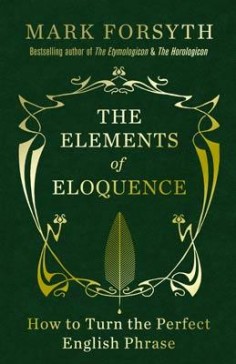
Book review: 'The Elements of Eloquence' by Mark Forsyth

The Elements of Eloquence: How to Turn the Perfect English Phrase
by Mark Forsyth
Icon Books
4 stars
David Wilson
How well do you write? Anyone can learn to breathe life into their writing through studying rhetoric, linguist Mark Forsyth says in his new guide.
If you study the verbal science you are in good company because, he writes, every budding writer must - even English literature's high priest, William Shakespeare, did the hard yards.
"Shakespeare was not a genius. He was … the most wonderful writer who ever breathed. But not a genius. No angels handed him his lines, no fairies proofread for him. Instead, he learnt techniques, he learnt tricks, and he learnt them well," Forsyth writes with trademark wit.

The linguist is especially scornful of the early plays - Love's Labours Lost, Titus Andronicus and Henry VI Part 1. Never read them? Relax, because none contains a memorable line, Forsyth claims.
Shakespeare's work improved gradually, through practice, writes Forsyth. His masterclass on how to turn a phrase like the Bard or Oscar Wilde covers every facet of rhetoric from understatement and overstatement to paradox, rhetorical questions and personification: giving an inanimate presence such as the moon human traits.
Targeting readers who hanker after literary immortality or just hope to acquire a knack for concocting one-liners, Forsyth addresses a wealth of case study fragments - think everything from pop lyrics and advertising slogans to snatches of the King James Bible and classic poetry. Readers are told why lines such as "To be or not to be" and "I love the smell of napalm in the morning" strike a chord.
"The one line from that song or film that you remember and don't know why you remember is almost certainly down to one of the figures, one of the flowers of rhetoric growing wild. They account for the songs you sing and the poems you love, although that is hidden from you at school," he says, teeing up an attack on the educational system.
In particular, he pans the practice of asking students to gauge what English fantasist William Blake thought of the tiger he immortalised, despite the fact the poet was a "nutjob". In a civilised society, Blake's views would be of interest to nobody except his parole officer, he writes.
Great thoughts are the philosopher's menial duty, he adds, noting that we fixate on substance, swayed by supposedly humourless overlords. "Stern people dislike rhetoric, and unfortunately it's usually stern people who are in charge: solemn fools who believe that truth is more important than beauty," Forsyth writes.
Reminiscent of satirical essayist Tim Kreider and comedian-writer Stephen Fry, Forsyth describes himself as a writer, journalist, proofreader, ghostwriter and pedant. He has written two popular if oddly titled linguistics jaunts: The Etymologicon and The Horologicon. Like them, The Elements of Eloquence makes a daunting, potentially boring subject exciting.
One nitpick: amid all the zingers, the Greek jargon the shameless pedant deploys is unappetising. A smart one-phrase explanation of each term at each chapter's start would have been good.
Another niggle is that he overstates the virtue of rhetoric - The Elements of Eloquence may drive many a fledgling writer to indulge in horribly purple prose. The likes of Wilde, Blake and Forsyth are hard acts to follow.
Irrespective, Forsyth's wickedly clever, irreverent take on rhetoric should cement his reputation as a virtuoso: it is hard to think of any other book that tackles the topic with such style.